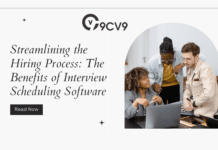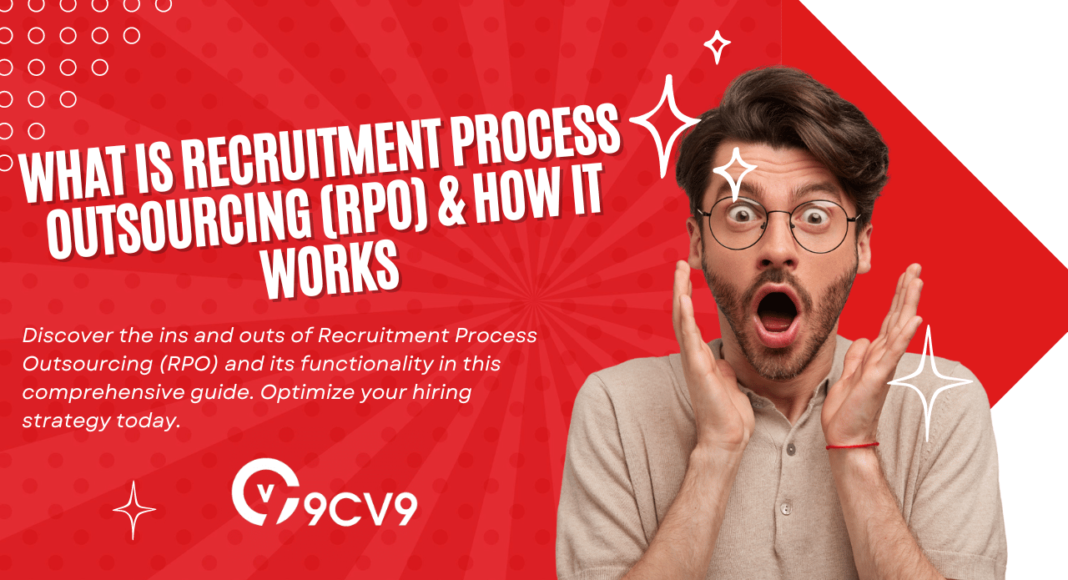Key Takeaways
- Streamline Talent Acquisition: Learn how Recruitment Process Outsourcing (RPO) enhances efficiency, reduces time-to-fill, and optimizes recruitment workflows for organizations of all sizes.
- Strategic Partnership for Success: Discover the power of strategic collaboration with RPO providers, leveraging tailored solutions, expertise, and technology to attract top talent and drive business growth.
- Future-Proof Your Recruitment Strategy: Stay ahead of the curve with insights into emerging trends and innovations shaping the RPO landscape, from AI integration to diversity initiatives, ensuring sustainable success in talent acquisition.
In the dynamic landscape of modern business, staying ahead demands not just innovation in products and services, but also in how companies attract, retain, and develop their most valuable asset: talent.
Enter Recruitment Process Outsourcing (RPO), a strategic solution that has been quietly reshaping the recruitment landscape for years, offering businesses unparalleled efficiency, scalability, and expertise in navigating the complexities of talent acquisition.

As competition for top talent intensifies, organizations are turning to RPO as a strategic lever to gain a competitive edge.
But what exactly is RPO, and how does it work?
In this comprehensive guide, we embark on a journey to demystify Recruitment Process Outsourcing, shedding light on its intricacies, benefits, and implementation strategies to empower businesses of all sizes to optimize their hiring processes.
Unveiling Recruitment Process Outsourcing (RPO)
At its core, Recruitment Process Outsourcing (RPO) represents a strategic partnership between an organization and an external provider, where the provider assumes full or partial responsibility for the company’s recruitment processes.
Unlike traditional staffing agencies or in-house recruitment teams, RPO providers operate as strategic allies, seamlessly integrating with the client’s operations to deliver tailored solutions that align with their unique goals and culture.
The Evolution and Rise of RPO
The origins of RPO can be traced back to the late 1990s, a period marked by rapid globalization and the advent of digital technologies.
As businesses grappled with the challenges of sourcing, screening, and hiring talent on a global scale, the need for more agile and cost-effective recruitment solutions became apparent.
This gave rise to the RPO industry, which has since evolved into a multi-billion-dollar market encompassing a diverse array of providers catering to various industries and geographies.
Distinguishing RPO from Traditional Recruitment
One common misconception is that RPO is simply a form of outsourcing akin to traditional BPO (Business Process Outsourcing).
While both models involve delegating tasks to external partners, RPO goes beyond mere transactional recruitment, focusing instead on building strategic, long-term relationships aimed at driving sustainable talent acquisition outcomes.
Unlike traditional recruitment methods that often operate on a contingent or reactive basis, RPO adopts a proactive, data-driven approach, leveraging advanced analytics, technology, and industry expertise to identify, engage, and retain top talent.
Unlocking the Benefits of RPO
The allure of RPO lies in its ability to deliver tangible business benefits across the entire recruitment lifecycle.
From reducing time-to-fill and cost-per-hire to enhancing candidate quality and improving employer brand perception, the advantages of RPO are manifold.
By outsourcing recruitment processes to specialized providers, organizations can free up internal resources, gain access to best practices and market insights, and adapt more quickly to evolving talent trends and demands.
Navigating the RPO Journey
Embarking on an RPO journey requires careful planning, collaboration, and alignment with organizational objectives.
From initial needs assessment and provider selection to implementation, execution, and ongoing optimization, each phase of the RPO lifecycle demands meticulous attention to detail and proactive communication between all stakeholders.
By establishing clear goals, expectations, and performance metrics from the outset, organizations can maximize the value derived from their RPO partnerships and drive sustainable business growth.
In the subsequent sections of this guide, we’ll delve deeper into the inner workings of Recruitment Process Outsourcing, exploring key processes, best practices, and emerging trends shaping the future of talent acquisition.
Whether you’re a seasoned HR professional seeking to streamline your recruitment efforts or a business leader looking to gain a competitive edge through strategic talent acquisition, this guide will equip you with the knowledge and insights needed to harness the full potential of RPO and propel your organization towards success.
Before we venture further into this article, we like to share who we are and what we do.
About 9cv9
9cv9 is a business tech startup based in Singapore and Asia, with a strong presence all over the world.
With over eight years of startup and business experience, and being highly involved in connecting with thousands of companies and startups, the 9cv9 team has listed some important learning points in this overview of What is Recruitment Process Outsourcing (RPO) & How It Works.
If your company needs recruitment and headhunting services to hire top-quality employees, you can use 9cv9 headhunting and recruitment services to hire top talents and candidates. Find out more here, or send over an email to [email protected].
Or just post 1 free job posting here at 9cv9 Hiring Portal in under 10 minutes.
What is Recruitment Process Outsourcing (RPO) & How It Works
- Understanding Recruitment Process Outsourcing (RPO)
- How Recruitment Process Outsourcing Works
- Key Players in the RPO Industry
- Challenges and Considerations in RPO Implementation
- Future Trends and Innovations in RPO
1. Understanding Recruitment Process Outsourcing (RPO)
In today’s competitive business landscape, organizations are constantly seeking ways to streamline their operations, optimize costs, and gain a competitive edge.
One area where this pursuit is particularly pronounced is talent acquisition.

Recruitment Process Outsourcing (RPO) has emerged as a strategic solution to address the evolving needs and challenges of modern recruitment.
Let’s delve deeper into the intricacies of RPO and unravel its core principles, evolution, and distinguishing features.
Definition and Core Principles
- Definition: Recruitment Process Outsourcing (RPO) refers to the delegation of some or all recruitment activities to an external provider, who assumes responsibility for executing various aspects of the recruitment process.
- Core Principles:
- Strategic Partnership: RPO involves establishing a strategic partnership between the client organization and the RPO provider, based on mutual trust, collaboration, and shared goals.
- Customization: RPO solutions are tailored to meet the specific needs, culture, and objectives of each client, ensuring alignment with their unique talent acquisition requirements.
- Continuous Improvement: RPO providers are committed to driving ongoing improvements in recruitment processes, leveraging data, analytics, and feedback mechanisms to refine strategies and enhance outcomes.
Evolution and Growth of RPO
- Historical Context: The concept of outsourcing recruitment activities dates back to the late 1990s, spurred by globalization, technological advancements, and changing workforce dynamics.
- Key Milestones:
- Emergence of Specialist Providers: Specialized RPO providers began to emerge, offering expertise in niche industries, geographic regions, or specific aspects of the recruitment process.
- Market Expansion: The RPO market witnessed significant growth, fueled by increasing demand from organizations seeking to optimize their recruitment processes and gain competitive advantage.
- Technological Advancements: The advent of digital platforms, AI-driven tools, and automation has transformed the RPO landscape, enabling providers to deliver more efficient, data-driven solutions.
Distinguishing RPO from Traditional Recruitment Methods
- Proactive vs. Reactive Approach: Unlike traditional recruitment methods, which are often reactive and transactional in nature, RPO adopts a proactive, strategic approach to talent acquisition.
- Long-Term Focus: While traditional recruitment may focus primarily on filling immediate vacancies, RPO emphasizes building long-term talent pipelines and enhancing employer branding to attract top talent.
- Scalability and Flexibility: RPO offers greater scalability and flexibility, allowing organizations to scale recruitment efforts up or down based on fluctuating demand, without the overhead costs associated with maintaining an in-house recruitment team.
Key Benefits of RPO for Businesses
- Enhanced Efficiency: By outsourcing recruitment processes to specialized providers, organizations can streamline their hiring workflows, reduce time-to-fill, and improve overall efficiency.
- Cost Savings: RPO can help lower recruitment costs by eliminating the need for internal infrastructure, overhead expenses, and time-consuming administrative tasks.
- Access to Expertise: RPO providers bring deep industry knowledge, market insights, and best practices to the table, enabling organizations to tap into a broader talent pool and make more informed hiring decisions.
In the next section, we’ll delve into the operational mechanics of Recruitment Process Outsourcing, exploring the key processes involved and how they contribute to achieving recruitment excellence.
2. How Recruitment Process Outsourcing Works
Recruitment Process Outsourcing (RPO) operates as a strategic partnership between organizations and external providers, aiming to streamline and optimize the talent acquisition process.
Understanding the mechanics of RPO is crucial for businesses looking to leverage this approach to enhance their recruitment outcomes.
Let’s explore the key components and processes involved in how RPO works.
Initial Assessment and Consultation
- Needs Analysis: RPO begins with a comprehensive assessment of the client’s recruitment needs, objectives, and pain points. This analysis helps identify areas for improvement and informs the development of a tailored RPO strategy.
- Stakeholder Alignment: RPO providers collaborate closely with key stakeholders within the client organization, including HR leaders, hiring managers, and executives, to ensure alignment of goals and expectations.
Tailored Recruitment Strategy Development
- Customization: Based on the findings from the initial assessment, the RPO provider designs a customized recruitment strategy tailored to the client’s unique requirements and industry dynamics.
- Market Research: RPO providers conduct thorough market research to identify trends, benchmarks, and competitor insights, enabling them to craft a strategy that positions the client as an employer of choice.
Sourcing and Attracting Top Talent
- Multi-Channel Sourcing: RPO providers leverage a variety of sourcing channels, including job boards, social media, talent networks, and industry-specific platforms, to identify and attract top talent.
- Employer Branding: RPO initiatives often include employer branding activities aimed at enhancing the client’s reputation as an employer, increasing visibility, and attracting passive candidates.
Screening and Assessment Processes
- Candidate Screening: RPO providers conduct initial screenings and assessments to evaluate candidates’ qualifications, skills, and cultural fit, ensuring alignment with the client’s requirements.
- Technology Integration: Advanced screening tools and assessment technologies, such as AI-driven resume parsing and psychometric assessments, enhance the efficiency and accuracy of candidate evaluations.
Interview Coordination and Candidate Experience Management
- Interview Facilitation: RPO providers manage the logistics of scheduling interviews, coordinating communication between candidates and hiring managers, and facilitating the interview process.
- Candidate Experience Enhancement: RPO initiatives focus on delivering a positive candidate experience at every touchpoint, from initial engagement to post-interview feedback, to ensure a seamless and memorable recruitment journey.
Offer Negotiation and Onboarding Support
- Offer Management: RPO providers assist in negotiating job offers, including salary negotiations, benefits discussions, and contract agreements, to secure successful hires.
- Onboarding Assistance: RPO partnerships often extend to providing onboarding support, helping new hires transition smoothly into their roles and integrate into the organization’s culture.
Ongoing Relationship Management and Feedback Loops
- Continuous Improvement: RPO providers engage in regular communication and feedback loops with the client to assess performance, identify areas for improvement, and refine recruitment strategies.
- Metrics and Analytics: Key performance indicators (KPIs) and metrics, such as time-to-fill, quality of hire, and candidate satisfaction scores, are tracked and analyzed to measure the effectiveness of RPO initiatives.
Understanding the operational intricacies of how Recruitment Process Outsourcing works empowers organizations to make informed decisions and maximize the value derived from their RPO partnerships.
In the subsequent sections, we’ll explore key players in the RPO industry, challenges in implementation, and future trends shaping the landscape of talent acquisition.
3. Key Players in the RPO Industry
The Recruitment Process Outsourcing (RPO) industry is comprised of a diverse array of providers offering specialized services tailored to meet the unique needs of organizations across various sectors.
Understanding the key players in the RPO landscape is essential for businesses seeking to identify strategic partners that can deliver optimal recruitment solutions.
Let’s explore some of the prominent players shaping the RPO industry.
RPO Service Providers: Types and Specialties
- Global RPO Providers: These are large-scale RPO firms with a global presence and the capacity to deliver end-to-end recruitment solutions across multiple geographies and industries. They typically offer a wide range of services, including recruitment strategy development, candidate sourcing, and onboarding support.
- Industry-Specific RPO Providers: Some RPO firms specialize in catering to specific industries or sectors, such as healthcare, IT, finance, or manufacturing. These providers possess deep domain expertise and understand the unique talent requirements and challenges within their respective industries.
- Boutique RPO Providers: Boutique RPO firms are smaller-scale providers that focus on delivering highly customized, niche recruitment solutions to niche markets or specialized talent pools. They often emphasize personalized service, flexibility, and agility in their approach.
Factors to Consider When Selecting an RPO Partner
- Industry Experience: Evaluate the RPO provider’s track record and experience within your industry or sector. Look for providers with a proven track record of success in addressing similar talent challenges and requirements.
- Service Offerings: Assess the range of services offered by the RPO provider and ensure they align with your organization’s needs and objectives. Consider whether the provider offers end-to-end recruitment solutions or specializes in specific areas of the recruitment process.
- Technology and Innovation: Evaluate the provider’s technological capabilities, including the use of advanced analytics, AI-driven tools, and recruitment platforms. Look for providers that leverage technology to enhance efficiency, accuracy, and candidate experience.
- Cultural Fit: Consider the cultural fit between your organization and the RPO provider. Look for providers that understand your organizational values, culture, and employer brand, and can effectively represent your brand to potential candidates.
- Flexibility and Scalability: Assess the provider’s ability to adapt to changing business needs and scale recruitment efforts as required. Look for providers that offer flexible engagement models and can adjust their services to accommodate fluctuations in demand.
- Client References and Testimonials: Seek out client references and testimonials to gain insights into the provider’s reputation, customer satisfaction levels, and past performance. Consider reaching out to existing or former clients to gather firsthand feedback on their experiences with the provider.
By carefully evaluating these factors and conducting thorough due diligence, organizations can identify the right RPO partner to support their recruitment objectives and drive business success.
In the next section, we’ll explore the potential challenges and considerations involved in implementing RPO solutions and strategies to mitigate them.
4. Challenges and Considerations in RPO Implementation
Implementing Recruitment Process Outsourcing (RPO) can yield significant benefits for organizations, but it also comes with its own set of challenges and considerations.
Understanding and addressing these challenges proactively is essential for ensuring the success of RPO initiatives.
Let’s explore some of the common challenges and key considerations in RPO implementation.
Potential Drawbacks and Limitations of RPO
- Loss of Control: Entrusting recruitment processes to an external provider may raise concerns about relinquishing control over hiring decisions and candidate selection criteria. Organizations must establish clear communication channels and governance structures to maintain oversight and alignment with strategic objectives.
- Cultural Alignment: Ensuring cultural alignment between the RPO provider and the client organization is crucial for fostering collaboration, trust, and effective communication. Misalignment in values, work culture, or employer branding can hinder the success of RPO partnerships and impact candidate experience.
- Integration Challenges: Integrating RPO processes with existing HR systems, technologies, and workflows can pose logistical challenges, particularly for organizations with complex IT infrastructures or legacy systems. Seamless integration is essential for ensuring data accuracy, process efficiency, and collaboration between internal and external stakeholders.
Mitigation Strategies for Common RPO Challenges
- Robust Governance Structure: Establish a robust governance structure that outlines roles, responsibilities, and decision-making processes for both the client organization and the RPO provider. This framework helps maintain alignment with strategic objectives, ensures accountability, and facilitates effective communication.
- Cultural Due Diligence: Conduct thorough due diligence to assess cultural fit between the client organization and the RPO provider. Engage in open dialogue, cultural exchange sessions, and joint workshops to foster understanding, build rapport, and align values and expectations.
- Technology Integration Planning: Develop a comprehensive plan for integrating RPO processes with existing HR systems and technologies. Collaborate closely with IT stakeholders to assess compatibility, address integration challenges, and implement seamless data exchange mechanisms.
Legal and Regulatory Considerations in Outsourcing Recruitment Processes
- Data Privacy and Security: Outsourcing recruitment processes involves sharing sensitive candidate data with external partners, raising concerns around data privacy and security. Ensure compliance with relevant data protection regulations, such as GDPR or CCPA, and implement robust data security measures to protect candidate confidentiality and mitigate the risk of data breaches.
- Compliance with Employment Laws: RPO providers must adhere to local employment laws, regulations, and industry standards when conducting recruitment activities on behalf of clients. Organizations should ensure that RPO agreements include provisions for compliance monitoring, legal oversight, and risk mitigation strategies to minimize legal exposure.
By addressing these challenges and considerations proactively, organizations can maximize the benefits of RPO while mitigating potential risks and ensuring successful implementation.
In the subsequent sections, we’ll explore emerging trends and innovations reshaping the future of RPO and talent acquisition.
5. Future Trends and Innovations in RPO
The landscape of Recruitment Process Outsourcing (RPO) is constantly evolving, driven by technological advancements, changing workforce dynamics, and shifting market trends.
Staying ahead of emerging trends and innovations is crucial for organizations seeking to maintain a competitive edge and optimize their recruitment strategies.
Let’s explore some of the future trends and innovations shaping the future of RPO.
Technological Advancements Shaping RPO
- AI and Machine Learning: Artificial intelligence (AI) and machine learning technologies are revolutionizing RPO by enabling predictive analytics, automation of repetitive tasks, and intelligent candidate matching. AI-powered algorithms can analyze vast amounts of data to identify patterns, predict candidate behavior, and optimize recruitment outcomes.
- Chatbots and Virtual Assistants: Chatbots and virtual assistants are increasingly being integrated into RPO processes to enhance candidate engagement, provide real-time support, and streamline communication. These tools enable round-the-clock interaction with candidates, answer frequently asked questions, and facilitate the scheduling of interviews and assessments.
- Predictive Analytics: Predictive analytics tools leverage historical data, candidate profiles, and performance metrics to forecast future hiring needs, identify talent gaps, and optimize recruitment strategies. By analyzing patterns and trends, organizations can make data-driven decisions, anticipate talent shortages, and proactively address workforce challenges.
Emerging Trends in Recruitment Automation and AI Integration
- Automated Sourcing and Screening: Recruitment automation platforms leverage AI and machine learning algorithms to automate repetitive tasks such as resume screening, candidate sourcing, and pre-qualification assessments. These platforms can identify top candidates based on predefined criteria, significantly reducing time-to-fill and improving the efficiency of recruitment processes.
- Video Interviewing and Assessment: Video interviewing and assessment tools are gaining popularity in RPO, allowing recruiters to conduct remote interviews, evaluate candidate skills, and assess cultural fit. These tools offer flexibility, convenience, and cost savings compared to traditional in-person interviews, particularly for remote or geographically dispersed candidates.
- Gamification in Recruitment: Gamification techniques, such as interactive assessments, virtual challenges, and simulation exercises, are being used to enhance candidate engagement, assess soft skills, and evaluate job fit. Gamified recruitment processes can create immersive experiences, capture candidates’ interest, and provide valuable insights into their capabilities and motivations.
Sustainability and Diversity Considerations in RPO Practices
- Diversity and Inclusion Initiatives: RPO providers are increasingly focusing on diversity and inclusion initiatives to promote equitable hiring practices, reduce bias, and foster a more inclusive workplace culture. By implementing targeted sourcing strategies, diversity training programs, and inclusive recruitment practices, organizations can attract a more diverse talent pool and improve workforce representation.
- Sustainability and Corporate Social Responsibility (CSR): Sustainable recruitment practices are becoming a key priority for organizations, driven by growing awareness of environmental and social issues. RPO providers are integrating sustainability principles into their operations, such as reducing carbon emissions, promoting ethical sourcing, and supporting community engagement initiatives, to align with clients’ CSR goals and enhance their brand reputation.
As organizations embrace these future trends and innovations in RPO, they can gain a competitive advantage, improve recruitment outcomes, and build a more resilient and diverse workforce.
By staying abreast of emerging technologies and best practices, organizations can position themselves for success in the rapidly evolving landscape of talent acquisition.
Conclusion
In the ever-evolving landscape of talent acquisition, Recruitment Process Outsourcing (RPO) stands out as a transformative solution that empowers organizations to optimize their recruitment strategies, enhance efficiency, and gain a competitive edge in attracting top talent.
Throughout this comprehensive guide, we’ve embarked on a journey to demystify RPO, explore its intricacies, and understand how it works.
From its definition and core principles to its evolution, key players, implementation challenges, and future trends, we’ve delved into every aspect of RPO to provide you with a holistic understanding of this strategic approach to talent acquisition.
By outsourcing recruitment processes to specialized providers, organizations can unlock a myriad of benefits, including enhanced efficiency, cost savings, access to expertise, and improved candidate quality.
We’ve examined the critical components of RPO implementation, from initial assessment and consultation to tailored recruitment strategy development, sourcing and attracting top talent, screening and assessment processes, and ongoing relationship management.
Through relevant examples and best practices, we’ve illustrated how organizations can navigate the complexities of RPO to achieve recruitment excellence and drive business success.
Furthermore, we’ve explored emerging trends and innovations shaping the future of RPO, including advancements in technology, recruitment automation, AI integration, sustainability, and diversity considerations.
By embracing these trends and leveraging innovative solutions, organizations can stay ahead of the curve, adapt to changing workforce dynamics, and build a more resilient and inclusive talent pipeline.
In conclusion, Recruitment Process Outsourcing represents not just a strategic partnership between organizations and external providers, but a paradigm shift in how businesses approach talent acquisition.
By harnessing the power of RPO, organizations can overcome recruitment challenges, capitalize on emerging opportunities, and position themselves for sustainable growth and success in the competitive global marketplace.
Whether you’re a small startup looking to scale your hiring efforts or a multinational corporation seeking to optimize your recruitment processes, RPO offers a flexible, scalable, and cost-effective solution to meet your evolving talent needs.
As you embark on your RPO journey, remember to align with trusted partners, prioritize cultural fit and collaboration, and embrace innovation to unlock the full potential of Recruitment Process Outsourcing.
Thank you for joining us on this enlightening exploration of Recruitment Process Outsourcing (RPO) and how it works.
We hope this guide has provided you with valuable insights and actionable strategies to elevate your recruitment practices and achieve your business objectives.
As you navigate the dynamic landscape of talent acquisition, remember that RPO is not just a solution—it’s a catalyst for transformation and success.
If your company needs HR, hiring, or corporate services, you can use 9cv9 hiring and recruitment services. Book a consultation slot here, or send over an email to [email protected].
If you find this article useful, why not share it with your hiring manager and C-level suite friends and also leave a nice comment below?
We, at the 9cv9 Research Team, strive to bring the latest and most meaningful data, guides, and statistics to your doorstep.
To get access to top-quality guides, click over to 9cv9 Blog.
People Also Ask
What is the outsourcing hiring process?
Outsourcing the hiring process involves delegating recruitment activities to external specialists or agencies. It typically includes initial assessment, job posting, candidate sourcing, screening, interviews, offer negotiation, and onboarding, allowing companies to focus on core operations while experts handle talent acquisition.
What is Recruitment Process Outsourcing strategy?
Recruitment Process Outsourcing (RPO) strategy involves partnering with external specialists to manage some or all recruitment functions. It includes initial assessment, tailored strategy development, candidate sourcing, screening, interviews, offer negotiation, and ongoing relationship management, aimed at optimizing talent acquisition processes for businesses.
What is Recruitment Process Outsourcing RPO?
Recruitment Process Outsourcing (RPO) is a strategic approach where organizations delegate some or all recruitment functions to external specialists. RPO providers handle tasks such as candidate sourcing, screening, interviewing, and onboarding, aiming to streamline and optimize the hiring process.































![Writing A Good CV [6 Tips To Improve Your CV] 6 Tips To Improve Your CV](https://blog.9cv9.com/wp-content/uploads/2020/06/2020-06-02-2-100x70.png)


